#devops training kphb
Explore tagged Tumblr posts
Text
Top Tools and Technologies Every Full Stack Java Developer Should Know
In today's fast-paced software development landscape, Full Stack Java Developers are in high demand. Companies seek professionals who can work across both the frontend and backend, manage databases, and understand deployment processes. Whether you're just starting your career or planning to upskill, mastering the right set of tools and technologies is key.
If you're considering a full stack java training in KPHB, this guide will help you understand the essential technologies and tools you should focus on to become industry-ready.

1. Java and Spring Framework
The foundation of full stack Java development starts with a deep understanding of Core Java and object-oriented programming concepts. Once you’ve nailed the basics, move to:
Spring Core
Spring Boot – simplifies microservices development.
Spring MVC – for building web applications.
Spring Security – for handling authentication and authorization.
Spring Data JPA – for database operations.
Spring Boot is the most widely adopted framework for backend development in enterprise applications.
2. Frontend Technologies
A full stack Java developer must be proficient in creating responsive and interactive UIs. Core frontend technologies include:
HTML5 / CSS3 / JavaScript
Bootstrap – for responsive designs.
React.js or Angular – for building dynamic SPAs (Single Page Applications).
TypeScript – especially useful when working with Angular.
3. Database Management
You’ll need to work with both relational and non-relational databases:
MySQL / PostgreSQL – popular SQL databases.
MongoDB – a widely used NoSQL database.
Hibernate ORM – simplifies database interaction in Java.
4. Version Control and Collaboration
Version control systems are crucial for working in teams and managing code history:
Git – the most essential tool for source control.
GitHub / GitLab / Bitbucket – platforms for repository hosting and collaboration.
5. DevOps and Deployment Tools
Understanding basic DevOps is vital for modern full stack roles:
Docker – for containerizing applications.
Jenkins – for continuous integration and delivery.
Maven / Gradle – for project build and dependency management.
AWS / Azure – cloud platforms for hosting full stack applications.
6. API Development and Testing
Full stack developers should know how to develop and consume APIs:
RESTful API – commonly used for client-server communication.
Postman – for testing APIs.
Swagger – for API documentation.
7. Unit Testing Frameworks
Testing is crucial for bug-free code. Key testing tools include:
JUnit – for unit testing Java code.
Mockito – for mocking dependencies in tests.
Selenium / Playwright – for automated UI testing.
8. Project Management and Communication
Agile and collaboration tools help manage tasks and teamwork:
JIRA / Trello – for task and sprint management.
Slack / Microsoft Teams – for communication.
Final Thoughts
Learning these tools and technologies can position you as a highly capable Full Stack Java Developer. If you're serious about a career in this field, structured learning can make all the difference.
Looking for expert-led Full Stack Java Training in KPHB? ✅ Get industry-ready with hands-on projects. ✅ Learn from experienced instructors. ✅ Job assistance and certification included.
👉 Visit our website to explore course details, check out FAQs, and kickstart your journey today!
0 notes
Text
🔥 Master DevOps with AWS – Your Career Accelerator! 🔥 Are you ready to supercharge your career in the most in-demand field of 2025? 🚀 Join our DevOps with AWS training program by Mr. Ram, starting 23rd June at 7:30 AM (IST). Whether you're a fresher or IT professional, this program is your path to becoming a DevOps pro with hands-on skills and cloud expertise.

🧠 Course Highlights: ✅ Real-time implementation of CI/CD pipelines ✅ Deep dive into Docker, Kubernetes, and container orchestration ✅ Git & GitHub for seamless version control ✅ Infrastructure automation with Terraform ✅ Extensive AWS training: EC2, S3, CloudWatch, IAM & more ✅ Hands-on projects to simulate real-world DevOps challenges
📅 Enroll today and gain practical exposure to industry-level DevOps tools and workflows. Stand out in interviews with in-demand skills and project experience.
✍️ Register Now: https://tr.ee/3L50Dt 🎓 Explore more free courses: https://linktr.ee/ITcoursesFreeDemos
Learn from industry experts at Naresh i Technologies and take your DevOps journey to the next level. Let’s build and deploy smarter together!
#DevOpsTraining#AWSCloud#FullStackDevOps#NareshIT#OnlineCourses#DockerTraining#KubernetesCourse#TerraformAutomation#GitAndGitHub#CareerInDevOps#CI_CDTools#LearnCloudTech
0 notes
Text
🌐 DevOps with AWS – Learn from the Best! 🚀 Kickstart your tech journey with our hands-on DevOps with AWS training program led by expert Mr. Ram – starting 23rd June at 7:30 AM (IST). Whether you're an aspiring DevOps engineer or an IT enthusiast looking to upscale, this course is your gateway to mastering modern software delivery pipelines.
💡 Why DevOps with AWS? In today's tech-driven world, companies demand faster deployments, better scalability, and secure infrastructure. This course combines core DevOps practices with the powerful cloud platform AWS, giving you the edge in a competitive market.

📘 What You’ll Learn:
CI/CD Pipeline with Jenkins
Version Control using Git & GitHub
Docker & Kubernetes for containerization
Infrastructure as Code with Terraform
AWS services for DevOps: EC2, S3, IAM, Lambda & more
Real-time projects with monitoring & alerting tools
📌 Register here: https://tr.ee/3L50Dt
🔍 Explore More Free Courses: https://linktr.ee/ITcoursesFreeDemos
Be future-ready with Naresh i Technologies – where expert mentors and project-based learning meet career transformation. Don’t miss this opportunity to build smart, deploy faster, and grow your DevOps career.
#DevOps#AWS#DevOpsEngineer#NareshIT#CloudComputing#CI_CD#Jenkins#Docker#Kubernetes#Terraform#OnlineLearning#CareerGrowth
0 notes
Text
🚀 Master DevOps with AWS – New Batch Starts 19th June! 🚀
Hey tech enthusiasts! Ready to dive into the world of continuous integration, cloud automation, and cutting‑edge deployment pipelines? Join our DevOps with AWS live training, led by industry expert Mr. Reyaz, starting 19th June at 9:00 AM (IST). Whether you’re a curious beginner or a developer looking to level up, this course covers everything you need to thrive in modern IT.
🔧 What You’ll Learn:
CI/CD Pipelines with AWS CodePipeline & CodeBuild
Infrastructure as Code using CloudFormation & Terraform
Containerization & Orchestration with Docker & EKS
Monitoring & Logging via CloudWatch & ELK Stack
Security Best Practices with IAM, KMS & VPC setups
Hands‑On Projects reflecting real‑world scenarios
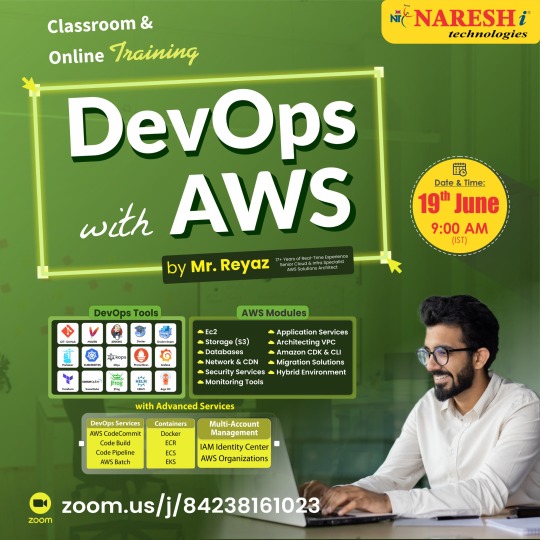
💡 Why Enroll?
Live, interactive sessions with Mr. Reyaz
Step‑by‑step labs you can pause & replay
Real‑time Q&A and doubt‑clearing support
Placement assistance to help you land that first DevOps role
🔗 Register for Early Seats – Don’t Miss Out! 👉 https://tr.ee/f3bN5E
✨ Explore even more free demo courses: 📚 https://linktr.ee/ITcoursesFreeDemos
Don’t just learn DevOps—live it. Automate your deployments, secure your cloud, and become the go‑to DevOps pro in your team.
0 notes
Text
Data Scientist vs Data Analyst vs ML Engineer: What’s the Difference?
As the demand for data professionals continues to rise, many aspiring tech enthusiasts are exploring career paths like Data Scientist, Data Analyst, and Machine Learning (ML) Engineer. While these roles may seem similar, each one has its own focus and required skill set. If you're planning to enter the data field and looking for the best data science training in KPHB, it's important to understand the differences between these roles to make an informed decision.
Who is a Data Scientist?
A Data Scientist is often considered the "problem-solver" in a data team. They use advanced techniques in statistics, programming, and machine learning to analyze large volumes of data and extract actionable insights. Data Scientists build predictive models, identify patterns, and help organizations make data-driven decisions. They frequently use tools like Python, R, SQL, and machine learning libraries such as Scikit-learn, TensorFlow, or PyTorch.
What Does a Data Analyst Do?
A Data Analyst plays a crucial role in analyzing and visualizing data to help stakeholders make informed decisions. Unlike Data Scientists, they focus more on historical data to identify trends and patterns. Their responsibilities include creating dashboards, generating reports, and using tools like Excel, Power BI, Tableau, and SQL. While their work may not involve heavy machine learning, it's essential for strategic planning and business intelligence.
Role of a Machine Learning Engineer
In the field of machine learning, a machine learning engineer connects data science with software development.Their main task is to take machine learning models created by Data Scientists and turn them into scalable, deployable systems. They write efficient code, optimize algorithms, and work with APIs, cloud platforms, and DevOps tools. Strong programming skills in Python, Java, or C++, along with knowledge of deployment tools like Docker or Kubernetes, are often required.
Key Differences
Data analysts interpret and report existing data, while all three roles work with data.
Data Scientists build models and generate predictive insights.Analyzing data and building models is the responsibility of Data Scientists.
Engineers who work on machine learning systems deploy and maintain them.
Conclusion
Choosing between these roles depends on your interests—whether it's analyzing data, building models, or creating production-ready systems. To gain the skills needed for any of these careers, enroll at SSSIT Computer Education, where expert-led, hands-on training can help you succeed in the dynamic world of data science.
#best software training in hyderabad#best software training in kukatpally#best software training in KPHB
0 notes
Text
Which Cloud Computing Platform Is Best to Learn in 2025?

Cloud computing is no longer optional—it’s essential for IT jobs, developers, data engineers, and career switchers.
But here’s the question everyone’s Googling: Which cloud platform should I learn first? Should it be AWS, Azure, or GCP? Which one gets me hired faster? And where do I start if I’m a fresher?
This article answers it all, using simple language, real use cases, and proven guidance from NareshIT’s cloud training experts.
☁️ What Is a Cloud Platform?
Cloud platforms let you run software, manage storage, or build apps using internet-based infrastructure—without needing your own servers.
The 3 most popular providers are:
🟡 Amazon Web Services (AWS)
🔵 Microsoft Azure
🔴 Google Cloud Platform (GCP)
🔍 AWS vs Azure vs GCP for Beginners
Let’s compare them based on what beginners care about—ease of learning, job market demand, and use case relevance.
✅ Learn AWS First – Most Versatile & Job-Friendly
Best cloud certification for freshers (AWS Cloud Practitioner, Solutions Architect)
Huge job demand across India & globally
Tons of free-tier resources + real-world projects
Ideal if you want to land your first cloud job fast
✅ Learn Azure – Best for Enterprise & System Admin Roles
Works great with Microsoft stack: Office 365, Windows Server, Active Directory
AZ-900 and AZ-104 are beginner-friendly
Popular in government and large MNC jobs
✅ Learn GCP – Best for Developers, Data & AI Enthusiasts
Strong support for Python, ML, BigQuery, Kubernetes
Associate Cloud Engineer is the top beginner cert
Clean UI and modern tools
🧑🎓 Which Cloud Course Is Best at NareshIT?
No matter which provider you choose, our courses help you start with real cloud labs, not theory. Ideal for:
Freshers
IT support staff
Developers switching careers
Data & AI learners
🟡 AWS Cloud Course
EC2, IAM, Lambda, S3, VPC
Beginner-friendly with certification prep
60 Days, job-ready in 3 months
🔵 Azure Cloud Course
AZ-900 + AZ-104 covered
Learn Azure Portal, Blob, AD, and DevOps
Perfect for enterprise IT professionals
🔴 GCP Cloud Course
Compute Engine, IAM, App Engine, BigQuery
30–45 Days, with real-time labs
Ideal for developers and data engineers
📅 Check new batches and enroll → Both online and classroom formats available.
🛠️ Beginner Cloud Engineer Guide (In 4 Simple Steps)
Choose one platform: AWS is best to start
Learn core concepts: IAM, storage, compute, networking
Practice using free-tier accounts and real labs
Get certified → Apply for entry-level cloud roles
🎯 Final Thought: Don’t Wait for the “Best.” Start Smart.
If you're waiting to decide which cloud is perfect, you’ll delay progress. All three are powerful. Learning one cloud platform well is better than learning all poorly.
NareshIT helps you start strong and grow faster—with hands-on training, certifications, and placement support.
📅 Start your cloud journey with us → DevOps with Multi Cloud Training in KPHB
At NareshIT, we’ve helped thousands of learners go from “I don’t get it” to “I got the job.”
And Articles are :
What is Cloud Computing? A Practical Guide for Beginners in 2025
Where to Start Learning Cloud Computing? A Beginner’s Guide for 2025
Entry level cloud computing jobs salary ?
Cloud Computing Job Roles for Freshers: What You Need to Know in 2025
Cloud Computing Learning Roadmap (2025): A Realistic Path for Beginners
How to Learn Cloud Computing Step by Step (From a Beginner’s Perspective)
How to Become a Cloud Engineer in 2025
How to become a cloud engineer ?
Cloud Computing Salaries in India (2025) – Career Scope, Certifications & Job Trends
Where to Start Learning Google Cloud Computing? A Beginner’s Guide by NareshIT
Future Scope of Cloud Computing in 2025 and Beyond
#BestCloudToLearn#AWSvsAzurevsGCP#NareshITCloudCourses#CloudForBeginners#LearnCloudComputing#CareerInCloud2025#CloudCertificationsIndia#ITJobsForFreshers#CloudLearningRoadmap#CloudTrainingIndia
0 notes
Text
🛑 Free Demos For ALL 🛑 ✍Enroll Now: https://shorturl.at/Qr3xo 👉Attend a Free Workshop on Complete Roadmap to become an Modern DevOps with AWS Cloud Training 📅 on: 12th April @ 07:30 AM (IST) For More Details: 🌐Visit: https://kphb.nareshit.com/kphb-new-batch-timetable/ 🌐Visit: https://nareshit.com/new-batches
java #corejava #oracle #clanguage #html #Aspdotnet #aspdotnetcore #program #software #Jobguaranteed #learning #learning #CareerReady #JavaDeveloper #Placements

0 notes
Text
Why .NET is the Backbone of Modern Applications and Web Development
Why .NET is the Backbone of Modern Applications and Web Development
In today’s rapidly evolving tech landscape, businesses and developers alike seek robust, scalable, and efficient solutions for application and web development. One framework that continues to stand the test of time is Microsoft’s .NET. For those looking to break into this powerful technology, finding the Best DotNet Training Institute in Hyderabad, Kukatpally, KPHB can be a game-changer in launching a successful career.
.NET has become the go-to framework for developing everything from enterprise-level software to dynamic web applications. Its versatility allows developers to build applications that work seamlessly across platforms, whether on desktop, web, mobile, or cloud. With the evolution into .NET Core and now .NET 6/7, it has become open-source, faster, and more efficient—making it highly suitable for modern development needs.
One of the key advantages of .NET is its vast class library and support for multiple languages like C#, F#, and VB.NET. This multi-language interoperability, coupled with excellent performance and security features, makes it ideal for developing high-performance applications. Furthermore, the integration of ASP.NET within the .NET ecosystem offers a streamlined approach to building modern, responsive, and secure web applications.
The .NET ecosystem is also supported by powerful development tools like Visual Studio, which enhances productivity through debugging, testing, and deployment features. It supports DevOps practices and integrates effortlessly with cloud services like Microsoft Azure, making it highly scalable and future-ready.
Moreover, .NET’s large community and continuous support from Microsoft ensure that developers have access to a rich pool of resources, documentation, and community-driven tools. Whether you're building a simple website or a complex enterprise solution, .NET provides the flexibility and power to get the job done efficiently.
Conclusion
In summary, .NET remains the backbone of modern applications and web development due to its flexibility, security, cross-platform capabilities, and strong community support. If you are looking to build a career in this high-demand domain, investing in the right training is essential. For top-tier learning and hands-on experience, Monopoly IT Solutions is your trusted partner in mastering .NET and stepping confidently into the world of modern software development.
0 notes
Text
#DevOps#kubernetes#maven#aws#ContinuousIntegration#CICD#Containerization#Microservices#DevOpsTools#DevOpsEngineer#Automation#Agile#InfrastructureAsCode#Course#education#software#CloudComputing#learnfromhome#nareshit
0 notes
Text
Full Stack Java is one of the most in-demand skills in the IT industry. This course will guide you through both front-end and back-end development using Java technologies. You will learn how to build dynamic web applications, manage databases, and develop robust APIs.
Our Full Stack Java Training in KPHB covers essential tools like Core Java, Advanced Java, Spring Boot, Hibernate, RESTful APIs, Angular, and SQL. You will also gain hands-on experience in working with real-time projects to enhance your coding skills.
By the end of the course, you will be capable of creating scalable and high-performance applications. You will also learn about deployment methodologies, cloud integration, and DevOps fundamentals, making you job-ready. Learn software skills from actual experts in live classes with or without videos, whichever works best for you.
🚀 Core Java & Full Stack Java Online Training with Placement Assistance📅 Start Date: 8th May 2025 🕚 Time: 11:00 AM IST 💻 Mode: Online/offline🔗 Register Now

Guarantee Full Stack Java Online Training with Placement Assistance
#java#java course#javaprogramming#javascripit#fullstackjava#javascript#javacourse#full stack training#full stack developer
0 notes
Text
Full Stack Java is one of the most sought-after skills in the IT business. This course will walk you through front-end and back-end programming with Java technology. You'll learn how to create dynamic web applications, manage databases, and create reliable APIs. Our Full Stack Java Training in KPHB includes vital tools like as Core Java, Advanced Java, Spring Boot, Hibernate, RESTful APIs, Angular, and SQL. You will also acquire practical experience working on real-time projects to improve your coding skills.
By the end of the course, you will be capable of creating scalable and high-performance applications. You will also learn about deployment methodologies, cloud integration, and DevOps fundamentals, making you job-ready. Learn software skills from actual experts in live classes with or without videos, whichever works best for you.
📢 New Batch Announcement! 🚀 Upcoming Tech Training Programs with Guarantee Placement Assistance ✅Placement Assistance Program on JAVA @ 11:00 AM (IST) From 8th May 2025 click the below link to Register
#javascript#programming#javaprogramming#java course#coding#java training institute#full stack developer#full stack java training#full stack course#full stack training#full stack web development
0 notes
Text
How to Become a Full Stack Java Developer in 6 Months – Full Roadmap

Are you looking to kickstart your career in software development? Becoming a Full Stack Java Developer is one of the most sought-after skills in today’s tech industry. With expertise in both frontend and backend development, Full Stack Java Developers are in high demand. In this article, we will provide a six-month roadmap to help you master Full Stack Java Training in KPHB efficiently.
Why Choose Full Stack Java Development?
Java is one of the most powerful programming languages, and its robust ecosystem makes it an excellent choice for full stack development. Companies across the globe rely on Java for developing scalable, secure, and efficient applications. By mastering the Full Stack Java Training in KPHB, you can unlock numerous job opportunities and excel in your career.
6-Month Roadmap to Becoming a Full Stack Java Developer
Month 1: Core Java and Fundamentals
Before diving into advanced topics, you need to have a strong grasp of Core Java.
Topics to Cover:
Java Basics – Variables, Data Types, Operators, Control Statements
Object-Oriented Programming (OOP)
Exception Handling
Collections Framework
Multithreading & Concurrency
File Handling & Serialization
JDBC (Java Database Connectivity)
Month 2: Advanced Java and Web Development Basics
Advanced Java:
Servlets & JSP
Hibernate
Spring Core
Spring Boot Basics
Frontend Development:
HTML5, CSS3, JavaScript
Bootstrap for Responsive Design
React.js Basics
Month 3: Spring Boot & Microservices Development
Spring Boot Advanced:
Spring MVC
Spring Security
RESTful APIs Development
Microservices Architecture
Spring Cloud & Service Discovery
Database:
SQL & PL/SQL (Oracle)
CRUD Operations with Java & SQL
Month 4: DevOps and Build Tools
Version Control & Build Tools:
Git, GitHub
Maven & Gradle
DevOps Tools:
Jenkins (CI/CD Automation)
Docker & Containerization
Sonarqube (Code Quality Analysis)
Datadog for Monitoring
ELK (Elasticsearch, Logstash, Kibana) for Logging
Month 5: Testing & Deployment
Testing Frameworks:
JUnit for Unit Testing
Mockito for Mocking
JMeter for Performance Testing
Cloud Deployment:
AWS Basics
Heroku Deployment
Month 6: Agile & Final Project
Agile Tools:
Jira for Project Management
Chef for Configuration Management
Capstone Project:
Develop a Full Stack Java Application using all the learned technologies
Deploy and optimize your project
Final Thoughts
Becoming a Full Stack Java Developer requires dedication, consistent learning, and hands-on practice. By following this six-month roadmap and enrolling in a structured Full Stack Java Training in KPHB, you can fast-track your career in software development. Stay committed, build real-world projects, and keep updating yourself with the latest tools and technologies.
If you’re serious about Full Stack Java Training in KPHB, start today and take the first step towards a successful career in Java development!
#coding#programming#artificial intelligence#software engineering#javascript#javaprogramming#java#fullstack#developer
1 note
·
View note
Text
☁️ Cloud Computing Courses for Beginners (2025): Where to Start and What to Expect
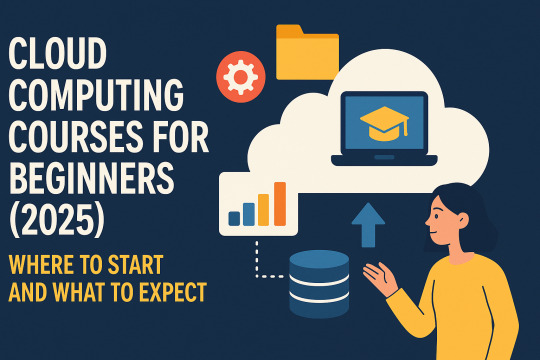
👨🎓 New to Tech? Wondering if You Can Learn Cloud Computing?
You’ve seen the job listings. You’ve heard about AWS, Azure, and Google Cloud. You might’ve even asked yourself, “Is this something I can learn, or is it only for experienced developers?”
Here’s the honest answer: Yes, you absolutely can learn cloud computing—even as a beginner. And no—you don’t need to be a coder to get started.
🧠 What Exactly Is Cloud Computing?
Let’s break it down in real-world terms.
Cloud computing is about accessing technology services (like servers, storage, and databases) over the internet instead of owning them physically. Just like you stream music without downloading every song, companies use cloud platforms to run apps without buying physical machines.
This makes cloud computing:
🔄 Scalable
⚡ Fast
💰 Cost-effective
🌐 Accessible from anywhere
Think of it as “IT on rent.”
🌐 What Are the Major Cloud Platforms?
There are three major players in the cloud computing space:
🔹 Amazon Web Services (AWS)
Largest market share globally
Great documentation and job demand
Ideal for beginners starting a cloud career
🔹 Microsoft Azure
Preferred by companies already using Microsoft services
Common in large enterprises and MNCs
Works well for IT support engineers or Windows admins
🔹 Google Cloud Platform (GCP)
Known for machine learning, analytics, and modern web apps
Growing ecosystem with startups and AI companies
Ideal for learners with interest in data + development
🎓 What to Expect from a Beginner-Friendly Cloud Course?
The right course should cover:
Cloud concepts: IaaS, PaaS, SaaS
Platform navigation (AWS Console, Azure Portal, GCP Dashboard)
Virtual Machines, storage, identity & access
Networking and basic security setup
Hands-on labs and small projects
Guidance for entry-level certifications
And most importantly, it should be beginner-friendly—not overloaded with theory or code.
🧑🏫 Why Learn Cloud with NareshIT?
At NareshIT, we’ve trained over 100,000 students in real-world IT skills. Our cloud computing courses are designed to help absolute beginners start from scratch, learn hands-on, and become confident enough to apply for jobs or certifications within weeks.
📘 NareshIT’s Cloud Computing Courses for Beginners
✅ AWS Cloud Foundations (Beginner Level)
Duration: 60 Days
Topics: EC2, IAM, S3, Lambda, VPC
Bonus: Live labs, project guidance, AWS Cloud Practitioner & Associate certification prep
Outcome: Ready for junior cloud jobs & support roles
✅ Azure Essentials Course (Beginner + Admin)
Duration: 45 Days
Topics: Azure AD, VMs, Blob Storage, Azure Monitor
Bonus: AZ-900 + AZ-104 prep, DevOps preview
Outcome: Ideal for support engineers and system admins
✅ GCP Starter Course (Beginner + Cloud Native Tools)
Duration: 30 Days
Topics: Compute Engine, IAM, BigQuery, Cloud Functions
Bonus: GCP Associate Cloud Engineer certification coaching
Outcome: Great for data lovers and devs entering cloud
🎓 DevOps with Multi-Cloud Training in KPHB by NareshIT
Located in Hyderabad’s tech-learning hub, NareshIT’s DevOps with Multi-Cloud Training in KPHB is tailored for:
✅ Beginners who want an IT job fast
✅ Professionals switching from support/manual testing
✅ Freshers looking for job-ready cloud + DevOps skills
🧾 Course Highlights:
Cloud Platforms Covered: AWS, Azure, GCP
DevOps Tools: Git, Jenkins, Docker, Kubernetes, Terraform
Duration: ~60 days
Batch Options: Weekday, Weekend, Fast-track
Includes: Real-world projects, certification support, job readiness prep
Location: KPHB, Hyderabad (Online + Offline options)
📅 New Batches Are Starting Now Choose from weekday, weekend, or fast-track options based on your schedule.
👉 Check NareshIT's Latest Cloud Batches Here
🧩 Bonus: Why Learning Cloud Computing Is Worth It
💼 High-demand job roles: Cloud support, DevOps, Admin
💸 Strong entry-level salaries: ₹4.5 to ₹7 LPA (for certified freshers)
🌱 Fast career growth: Start simple, grow into architecture or security
🌍 Global opportunities: Remote jobs across India, US, UAE, and more
You don’t need to master everything at once. Just start with one platform. And with the right mentor, you'll move faster than you thought possible.
#DevOpsWithMultiCloud#CloudCoursesHyderabad#LearnAWSAzureGCP#CareerInCloud#DevOpsForBeginners#CloudSkillsIndia#MultiCloudTrainingIndia#TechJobsHyderabad#CloudCertifications2025
0 notes
Text
Top 5 In-Demand DevOps Roles and Their Salaries in 2025
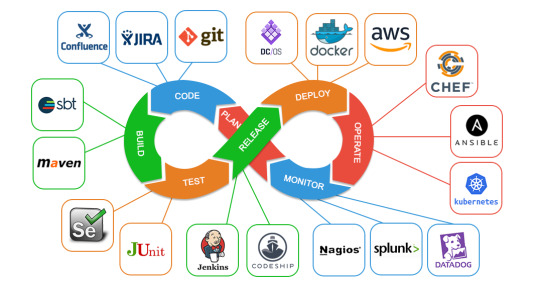
The DevOps field continues to see massive growth in 2025 as organizations across industries prioritize automation, collaboration, and scalability. Here’s a look at the top 5 in-demand DevOps roles, their responsibilities, and salary trends.
1. DevOps Engineer
Role Overview: The cornerstone of any DevOps team, DevOps Engineers manage CI/CD pipelines, ensure system automation, and streamline collaboration between development and operations teams.
Skills Required: Proficiency in Jenkins, Git, Docker, Kubernetes, and scripting languages like Python or Bash.
Salary Trends (2025):
Freshers: ₹6–8 LPA
Experienced: ₹15–20 LPA
2. Site Reliability Engineer (SRE)
Role Overview: SREs focus on maintaining system reliability and improving application performance by blending engineering and operations expertise.
Skills Required: Knowledge of monitoring tools (Prometheus, Grafana), incident management, and system architecture.
Salary Trends (2025):
Entry-Level: ₹7–10 LPA
Experienced: ₹18–25 LPA
3. Cloud Engineer
Role Overview: Cloud Engineers design, manage, and optimize cloud infrastructure, ensuring it is secure, scalable, and cost-effective.
Skills Required: Hands-on experience with AWS, Azure, or Google Cloud, along with infrastructure as code (IaC) tools like Terraform or Ansible.
Salary Trends (2025):
Beginners: ₹8–12 LPA
Senior Professionals: ₹20–30 LPA
4. Kubernetes Specialist
Role Overview: As businesses increasingly adopt containerization, Kubernetes Specialists manage container orchestration to ensure smooth deployments and scalability.
Skills Required: Deep understanding of Kubernetes, Helm, Docker, and microservices architecture.
Salary Trends (2025):
Mid-Level: ₹8–15 LPA
Senior-Level: ₹18–25 LPA
5. DevSecOps Engineer
Role Overview: DevSecOps Engineers integrate security practices within the DevOps lifecycle, ensuring robust systems from development to deployment.
Skills Required: Expertise in security tools, vulnerability assessment, and compliance frameworks.
Salary Trends (2025):
Early Career: ₹9–14 LPA
Experienced Professionals: ₹22–30 LPA
Upskill for Your Dream Role
The demand for DevOps professionals in 2025 is higher than ever. With the right skills and certifications, you can land these lucrative roles.
At Syntax Minds, we offer comprehensive DevOps training programs to equip you with the tools and expertise needed to excel. Our job-oriented courses are available both offline and online, tailored for fresh graduates and working professionals.
Visit Us: Flat No. 202, 2nd Floor, Vanijya Complex, Beside VRK Silks, KPHB, Hyderabad - 500085
Contact: 📞 9642000668, 9642000669 📧 [email protected]
Start your journey today with Syntax Minds and take your career to new heights!
#artificial intelligence#data science#deep learning#data analytics#machine learning#DevOps#Cloud#AWS#AZURE#data scientist
0 notes
Text
Devops best institute in hyderabad
To create an evident aura of expertise and education that encompasses each graduate and emanates directly from the quality of the individual instructor’s influence and contact with the student.
DevOps (development & operations) is an endeavor software development express used to mean a type of agile connection amongst development & IT. V Cube is one of the best institutes for DevOps training in Hyderabad, We offer comprehensive and in-depth training in DevOps. DevOps is an endeavor software development express used to mean a type of agile connection between development & IT operations. Join DevOps Training in KPHB
We are committed to helping our students succeed, and we recognize that hard work and dedication deserve to be rewarded. That’s why we have a rewards program in place for our students.
Contact Info 2nd Floor Above Raymond’s Clothing Store KPHB, Phase-1, Kukatpally, Hyderabad +91 7675070124, +91 905945674
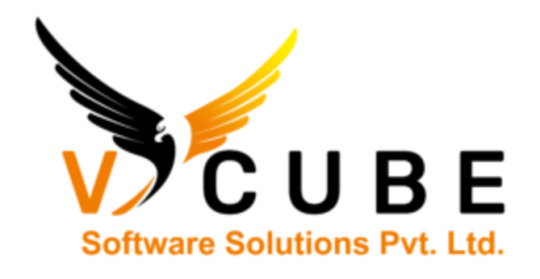
1 note
·
View note
Text
KosmikTechnologies: KOSMIK is a Global leader in training, development, and consulting services that help students bring the future of work to life today in a corporate environment. We have a team of certified professionals and experienced faculty working with latest technologies in CMM level top MNCs. About course: Key Features: Interactive Learning at Learners convenience Industry Savvy Trainers Real-Time Methodologies Topic wise Hands-on / Topic wise Study Material Best Practices /Example Case Studies Support after Training Resume Preparation Certification Guidance Interview assistance Lab facilities About offered courses: kosmik Provides Python, AWS, DevOps, Power BI, Azure, ReactJS, AngularJS, Tableau, SQL, MSBI, Java, selenium, Testing tools, manual testing, etc… Contact US: KOSMIK TECHNOLOGIES PVT.LTD 3rd Floor, Above Airtel Showroom, Opp KPHB Police Station, Near JNTU, Kukatpally, Hyderabad 500 072. INDIA. India: +91 8712186898, 8179496603, 6309565721
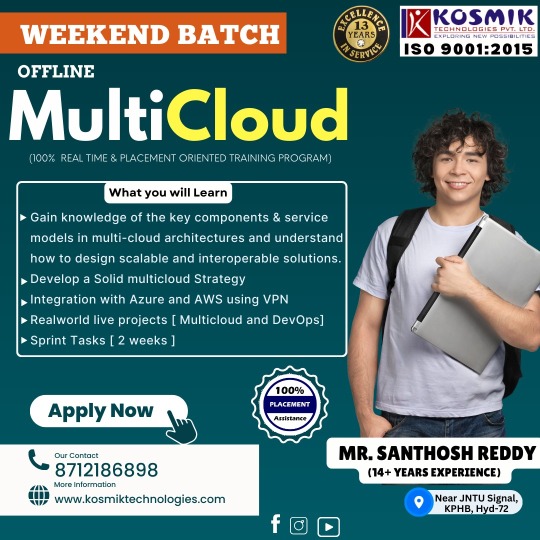
#kosmik#python#selenium training#machine learning#developer#traininginstitute#hyderabad#kphb#selenium#multicloud
0 notes